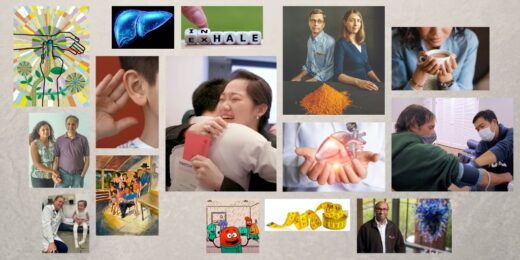The ultimate goal: a vaccine with coverage so broad it can protect against viruses never before encountered.
Tag: News Home
Promoted to News Center home page.
Searching for vaccine variability in the land of the flu
The ultimate goal: a vaccine with coverage so broad it can protect against viruses never before encountered.
The hunt for a vaccine that fends off not just a single viral strain, but a multitude
Stanford Medicine researchers are designing vaccines that might protect people from not merely individual viral strains but broad ranges of them. The ultimate goal: a vaccine with coverage so broad it can protect against viruses never before encountered.
2023 recap: Stories and videos that most connected with our readers
We share the stories and videos published in 2023 on our News Center, Scope and Stanford Medicine magazine sites that resonated most with our readers online and on social media.
The endometriosis enigma: What to know about this disruptive disease
Despite the fact the disease greatly reduces the quality of many women’s lives, endometriosis remains understudied.
Can art aid in healing? Portrait Project is using AI, traditional art to find out
Stanford Medicine researchers are helping patients use AI image-generation software as part of a unique study that aims to quantify how creating art aids patients in their recovery.
Feeling lonely? You’re far from alone: Expert advice on how to get reconnected
A loneliness prescription? Anna Lembke says 'Action. Don’t be passive. Do at least one thing each day that makes you feel more connected to other people and the world.'
How digital tools are heading off alcohol-related health problems
Two of Brian Suffoletto's close friends died in an alcohol-related car accident when he was in college. It helped focus his path in medicine.
As seasons change, so does the guidance around antibiotics: Here’s what you need to know now
Clinical fellow Alex Zimmet, MD, a member of Stanford Medicine’s antimicrobial stewardship team, discusses why antibiotic overuse is a problem and how you can help combat it.
Do you sound like you? Gender-affirming voice therapy allows people to speak authentically
Why is it important to offer gender-affirming voice therapy or surgery? We spoke with experts on all sides of the equation.
A veteran serving veterans: Orthopaedic surgeon reflects on time in military, medicine
A proud veteran and surgeon, Constance Chu leads the Joint Preservation Center and Sports Medicine program at the Palo Alto VA.
How one blind genetic counselor is doing her part to address ableism
Many people mistakenly assume that because Ronit Mazzoni has been blind since birth, her career choice must have been related to her condition.
Emergence program provides socially conscious entrepreneurs an on-campus incubator
Emergence comprises some 100 experts, serving as speakers, advisors or mentors, that guide how to identify societal needs and carry out the entrepreneurial process.
The time ‘is now, in the beginning’: How do we ensure AI tools aren’t biased?
New artificial intelligence tools have the potential to revolutionize health care. But Stanford researchers argue that disparities could worsen without intervention now.
AI, medicine and race: Why ending ‘structural racism’ in health care now is crucial
Health care providers must reckon with inherent race-based biases in medicine, which can reinforce false stereotypes in algorithms and lead to improper treatment recommendations or late diagnoses.
New policy is taking sexual orientation, gender out of blood donor equation
New guidelines will continue to ensure the safety of the nation's blood supply, according to the Food and Drug Administration.

















